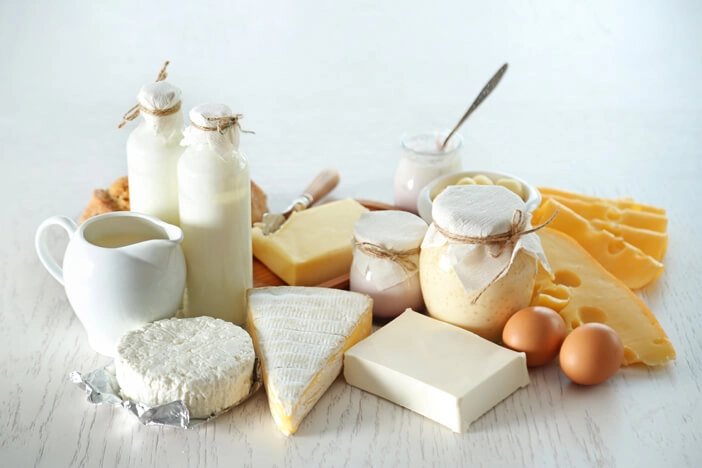The milk myth - remedy or fattener?

Intro
The milk myth – healthy or unhealthy? Do dairy products help you lose weight? When it comes to the topic of healthy eating, there are often conflicting ideas about the effects of milk and milk products. So which of the numerous claims about dairy products are true? In this article we get to the bottom of it.
Milk - The first food we consume
Milk is the first staple food for almost all mammals. A mother’s milk is an essential part of an infant’s diet for growing up and strengthening their bones. So milk is a natural food for babies. But what happens after breastfeeding? Historically people used to lose the ability to process lactose after breastfeeding. Indeed more than 80% of people in the world are still lactose intolerant. However in Europe, the tolerance of lactose has become wide spread through evolutionary development. Drinking milk as an adult seems to contradict nature. After all, humans are the only species that drink the breast milk of other living creatures. So what exactly is in milk and how healthy is it really?
What kind of milk do we drink?
Cow milk consists of around 80% water. The remaining 20% is carbohydrates, protein, vitamins, minerals, milk fat and trace elements. In the supermarket, milk is sold with varying fat levels. Multiple stages of pasteurisation, i.e. heating, not only makes the milk last longer, but also kills off many germs. At the same time, some healthy enzymes are also lost during the process. Homogenisation, a process in which the fat is distributed as evenly as possible in the milk so that no cream is deposited, also means that the milk undergoes further processing in which important nutrients are lost. In the milk debate, a distinction must therefore be made between processed milk from the supermarket and fresh milk from a dairy cow.
Are low-fat or full-fat products healthier and more effective in helping to lose weight?
Unfortunately there is no universally correct answer to this question. On the one hand, low-fat products naturally contain fewer calories than full-fat products, but studies have shown that full-fat products do not make you fat. One of the scientists’ theories is that people who eat low-fat products often consume more carbohydrates in order to feel statisfied. Full-fat milk also contains more essential omega-3 fatty acids than skimmed milk.
Does milk protect against osteoporosis?
There are many questions surrounding milk that have not yet been conclusively answered, but researchers do agree on the osteoporosis question. Just as milk has a positive effect on the development of small children because of its high calcium content, milk also protects against osteoporosis, i.e. the breaking of bones, in older age. Note however, the cause of osteoporosis is not calcium deficiency, but rather an imbalance between the cells that break down and build bone matter. This imbalance is not influenced by milk consumption. So milk is neither the cause nor the cure for osteoporosis.
Add dairy products to your diet to lose weight
Milk can support you on the way to your goal weight. The large number of dairy products that are consumed especially at breakfast can make the start of the day easier. If you can’t tolerate lactose, you can find a wide range of lactose-free substitute products in almost all supermarkets. Lactose intolerance is just one of the many food intolerances that people have to deal with. With individual nutrition plans from Upfit, allergies or intolerances are no longer a problem. You can decide for yourself which foods will get you to your personal goal weight. Create your individual diet plan now for losing weight and set out on the way to your desired weight.
